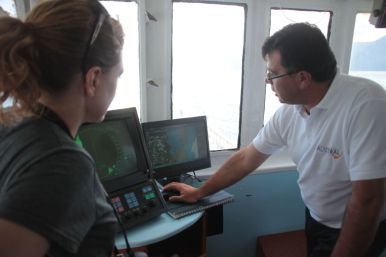The battleship was heavily damaged. The engine has been damaged due to the long high speed chase through the pacific. It was chased by a whole fleet, the British fleet. The battleship is the Dresden, a German ship that had been in battle with the British fleet for some time and now it was trying to escape it’s doom.
The Germans were lucky, a local guide knew of an unmapped bay where it could hide. And so they navigated through the narrow fjords of Chile and carefully maneuvered the 180m ship through this small gap into an opening fjord. It was able to hide here for more than 3 months and getting most damaged repaired. It went back into to the pacific and was sunk eventually by the own crew since the British were preparing to take it under fire even though it was in a neutral Chilean harbor with no coals, unable to escape or battle back.
It is one of these famous stories of the first world war, when battles have been fought all over the planet and stories of death, suffocation, hope and destruction appeared on a daily bases. I have heard the story of the Dresden before. And now Claudio is telling it to me again. “There, through this small gap the Dresden was maneuvered through”. I look at a gap in the mountains, a mere 160m wide, with vertical walls on both sides. The small gap makes a sharp turn, so that it looks like a small opening in the mountains that would end soon. But the map on the table shows the fjord is opening on the other side of the small gap and is actually a huge bay. “A difficult and brilliant maneuver, but the only chance the Dresden had” Claudio adds.
Claudio is the captain of the small ferry that connects with the northern end of the Carretera Austral in southern Chile. I talked to him when he was getting his coffee and so he invited us on the bridge of the ferry.
He showed us all the equipment of the bridge, the different radar systems, radios, GPS, the classic sea maps, the steering, the log entries. It is very interesting and Claudio is a very nice person. Very calm, relaxed. He used to be in the salmon business. The whole southern part of Chile is very big in breeding salmon. Everywhere are huge farms with hundred thousands of salmon. He explained to us the procedure of how the salmon get breed in huge sweet water tanks, before they are transported alive in boats with water tanks to the salt-water plants. These are basically huge fishnets, set up in the water. You can see these stations everywhere here in the fjords.
“It is a hard business, hard work” he says. So after many years in this business he became captain of the ferry and brings cars, busses, motorbikes and some few tourist bicyclists to the Carretera Austral. He does this trip every day, 4 hours south, 4 hours north. 7 days a week, all around the year. He gets long vacation though, and so when he is at home with his little kids and his wife he has real quality time.
He knows the fjords around here by heart. “172,5” he says, giving a slight course correction to the pilot.
Ricardo uses the two levers to bring the ship to the new course. He is piloting the ferry now. He used to be a fisherman. On different boats he hired all over the world. He travelled along the South African coast, all along North and South America, crossed the Atlantic a couple of times. He describes the rough sea in the southern pacific and how the waves hit the boat from below when he passed Cap Hoorn. “Very big waves, like hammer” he says, moving his fist from below against his left hand, demonstrating how the waves hit the boat from underneath.
When he talked about the big waves in the antartican sea I asked him if he was ever scared. “No. The sea, it’s my life”. Looking at his face with the leather like skin I believe him.
So why did he end up here, on a small ferry going back and forth the same route every day. That must be boring. But the fishing business is hard. Very hard. He obviously enjoys the more quite days he has in his new job.
Given the beauty of the surrounding area it is easy to understand how this is a great job for a seaman.























